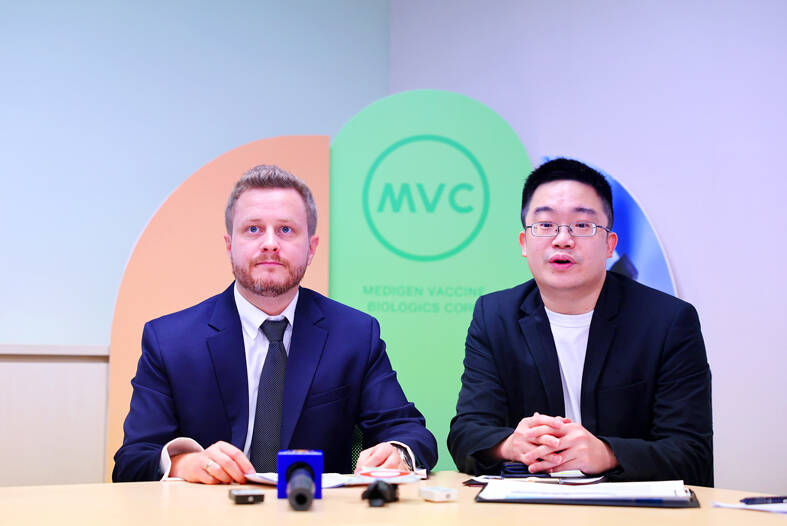The WHO’s addition of Medigen Vaccine Biologics Corp’s (高端疫苗) COVID-19 vaccine to its pool marks the first time the world body has authorized a Taiwan-made vaccine and it is an endorsement of the country’s vaccine industry, Minister of Health and Welfare Hsueh Jui-yuan (薛瑞元) said yesterday.
Medigen on Tuesday announced an out-licensing agreement with the WHO’s COVID-19 Technology Access Pool (C-TAP) and the UN-backed Medicines Patent Pool, which makes its vaccine technology available to people in need worldwide.
Pharmaceutical companies are required to provide toxicology results, animal and clinical trial statistics, as well as production data for the C-TAP initiative to review, Hsueh said, adding that the information requirements do not differ significantly from an application to the Food and Drug Administration for emergency use authorization.

Photo: CNA
C-TAP’s announcement was an affirmation of Taiwan’s vaccine manufacturing industry, he said.
Advisory Committee on Immunization Practices head Lee Ping-ing (李秉穎) said that the WHO’s approval of Medigen’s vaccine speaks volumes, as the organization examined the vaccine with the help of experts, and deemed that the manufacturing process and technology are mature.
Medigen’s vaccine has had fewer adverse reactions than other messenger RNA (mRNA) or adenoviral vector vaccines, Lee said.
Many of the WHO-validated COVID-19 vaccines also used immune-bridging, but they were not required to pass phase three trials due to provisions allowed in emergency use.
An international body authorizing a vaccine developed using government funds is “a good thing,” Lee said.
Shih Shin-ru (施信如), a professor in Chang Gung University’s Research Center for Emerging Viral Infections, said that authorization of Medigen technology for WHO use would allow other countries and companies to develop non-mRNA-based vaccines to help protect people who previously had adverse reactions or cannot receive mRNA-based vaccines.

A Ministry of Foreign Affairs official yesterday said that a delegation that visited China for an APEC meeting did not receive any kind of treatment that downgraded Taiwan’s sovereignty. Department of International Organizations Director-General Jonathan Sun (孫儉元) said that he and a group of ministry officials visited Shenzhen, China, to attend the APEC Informal Senior Officials’ Meeting last month. The trip went “smoothly and safely” for all Taiwanese delegates, as the Chinese side arranged the trip in accordance with long-standing practices, Sun said at the ministry’s weekly briefing. The Taiwanese group did not encounter any political suppression, he said. Sun made the remarks when

The Taiwanese passport ranked 33rd in a global listing of passports by convenience this month, rising three places from last month’s ranking, but matching its position in January last year. The Henley Passport Index, an international ranking of passports by the number of designations its holder can travel to without a visa, showed that the Taiwan passport enables holders to travel to 139 countries and territories without a visa. Singapore’s passport was ranked the most powerful with visa-free access to 192 destinations out of 227, according to the index published on Tuesday by UK-based migration investment consultancy firm Henley and Partners. Japan’s and

BROAD AGREEMENT: The two are nearing a trade deal to reduce Taiwan’s tariff to 15% and a commitment for TSMC to build five more fabs, a ‘New York Times’ report said Taiwan and the US have reached a broad consensus on a trade deal, the Executive Yuan’s Office of Trade Negotiations said yesterday, after a report said that Washington is set to reduce Taiwan’s tariff rate to 15 percent. The New York Times on Monday reported that the two nations are nearing a trade deal to reduce Taiwan’s tariff rate to 15 percent and commit Taiwan Semiconductor Manufacturing Co (TSMC, 台積電) to building at least five more facilities in the US. “The agreement, which has been under negotiation for months, is being legally scrubbed and could be announced this month,” the paper said,

MIXED SOURCING: While Taiwan is expanding domestic production, it also sources munitions overseas, as some, like M855 rounds, are cheaper than locally made ones Taiwan and the US plan to jointly produce 155mm artillery shells, as the munition is in high demand due to the Ukraine-Russia war and should be useful in Taiwan’s self-defense, Armaments Bureau Director-General Lieutenant General Lin Wen-hsiang (林文祥) told lawmakers in Taipei yesterday. Lin was responding to questions about Taiwan’s partnership with allies in producing munitions at a meeting of the legislature’s Foreign Affairs and National Defense Committee. Given the intense demand for 155mm artillery shells in Ukraine’s defense against the Russian invasion, and in light of Taiwan’s own defensive needs, Taipei and Washington plan to jointly produce 155mm shells, said Lin,